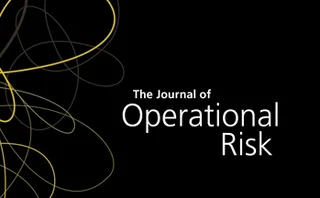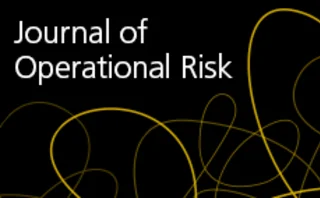Technical paper/Operational risk
The role of management accounting practices in operational risk management: the case of Palestinian commercial banks
This paper follows an exploratory, descriptive approach to investigate the role that management accounting practices plays in managing operational risks in the Palestinian commercial banking sector.
Fighting Covid-19 in countries and operational risk in banks: similarities in risk management processes
This paper shows how banks managing operational risk and countries tackling Covid-19 could learn from each other to overcome obstacles in effectively mitigating major risks.
On modeling contagion in the formation of operational risk loss
This paper models an overall operational risk loss caused by the accumulation of intermediate losses incurred at each process via a mechanism of network contagion across distinct processes within the boundary of a bank.
An approach to simultaneously assess operational risk and maturity levels in information technology management
The aim of this paper is to investigate the operational risk and maturity level of IT in an anonymized financial institution, based on the American Productivity and Quality Center benchmark and control objectives for information and related technologies.
Risk governance, market competition and operational risk disclosure quality: a study of the ASEAN-5 banking sector
This paper investigates the impact of risk governance and market competition on banks' operational risk disclosure (ORD) quality (total and voluntary) in the Association of Southeast Asian Nations (ASEAN-5) banking sector
The economic cost of a fat finger mistake: a comparative case study from Samsung Securities’s ghost stock blunder
This paper quantifies the economic cost of Samsung Securities’s ghost stock blunder using the synthetic control method.
The impact of culture upon operational risk management guidelines in the banking sector of selected Asian countries
The central banks of different countries regulate ORM according to the specificities of their national banking industry. This paper tests the hypothesis that such regulatory openness results in legal texts that are highly influenced by the culture of the…
Measurement of operational risk regulatory capital in the banking sector: developed countries versus emerging markets
This paper addresses operational risk as a fundamental risk type faced by banks in emerging and developed economies.
Bank supervision: lessons from the post-2008 banking crisis
This paper considers the learning points from official third-party reports produced in the wake of supervisory failures that can be applied to the management of front-line bank supervisors.
Regulatory arbitrage in the use of insurance in the new standardized approach for operational risk capital
Basel’s new standardized approach (SA) for operational risk capital may allow for regulatory arbitrage through the use of insurance. Under the SA, banks will likely have an incentive to insure recurring losses. Such insurance can meaningfully reduce…
Critical variables in the implementation of a risk-based internal audit: a theoretical and empirical investigation of Greek companies
This paper investigates the critical variables for the implementation of RBIA in Greek companies and examines the relationship between the above variables and RBIA implementation using data collected by 105 internal auditors, external auditors, directors…
Detection of financial fraud risk: implications for financial stability
This introduction to the Journal of Operational Risk special issue shines a light on the relationship between financial fraud risks and financial stability.
The strange case of the Jet Airways bankruptcy: a financial structure analysis
The authors investigate the financial structure of Jet Airways, with the aim of understanding whether financial turbulence for an airline company can constitute an antecedent for predicting the risk of bankruptcy.
Ten laws of operational risk
This paper sets out ten laws that govern the behavior of operational risk relating to the occurrence and detection/duration of events; the rapidity with which firms suffer losses; the lags in crystallization of losses; and internal and external drivers…
Quantification of regulatory capital for management of operational risk in banks: study from an emerging market economy
This paper studies the various methodologies used by an Indian bank in its operational risk management activities: these include loss database analysis, risk control self-assessment and key risk indicator (KRI) identification.
Is there anybody out there? Detecting operational outages from Large Value Transfer System transaction data
This paper develops a method to identify operational outages of participants in the Canadian Large Value Transfer System (LVTS).
Evaluating cyclic risk propagation through an organization
Many large organizations have risk that propagates because of the dependencies between their various major organizational components. This paper addresses when cycles of dependencies exist in an organization or system of systems.
Does the source of information influence depositors’ withdrawal intentions during operational events?
The objective of this paper is to identify whether depositors’ intentions to withdraw funds during operational risk events differ based on the source of information.
Benchmarking operational risk stress testing models
This paper outlines several approaches to benchmarking operational loss projections under stressed scenarios using both accounting metrics and historical loss experience.
What is essential is invisible to the eye: prioritizing near misses to prevent future disasters
Near misses represent a primary information source to analyze the operational risk exposure of a company, since they can reveal gaps in the control environment. The model proposed in this paper aims at identifying the most dangerous events that could…
Strategic and technology risks: the case of Co-operative Bank
This paper studies the growth by acquisition strategy embarked upon by a mid-sized UK bank, the Co-operative Bank; this strategy was a disaster, leaving a heretofore successful bank in dire trouble and on the block for buyers at a substantial discount to…
An emergent taxonomy for operational risk: capturing the wisdom of crowds
In this paper, the author takes a data-driven approach and combines the individual active taxonomies of sixty large financial institutions (fifty-eight for construction and two for validation) to create a coherent new reference taxonomy: the ORX…
Incremental value-at-risk
This paper proposes a novel method for estimating future operational risk capital: incremental value-at-risk (IVaR)



